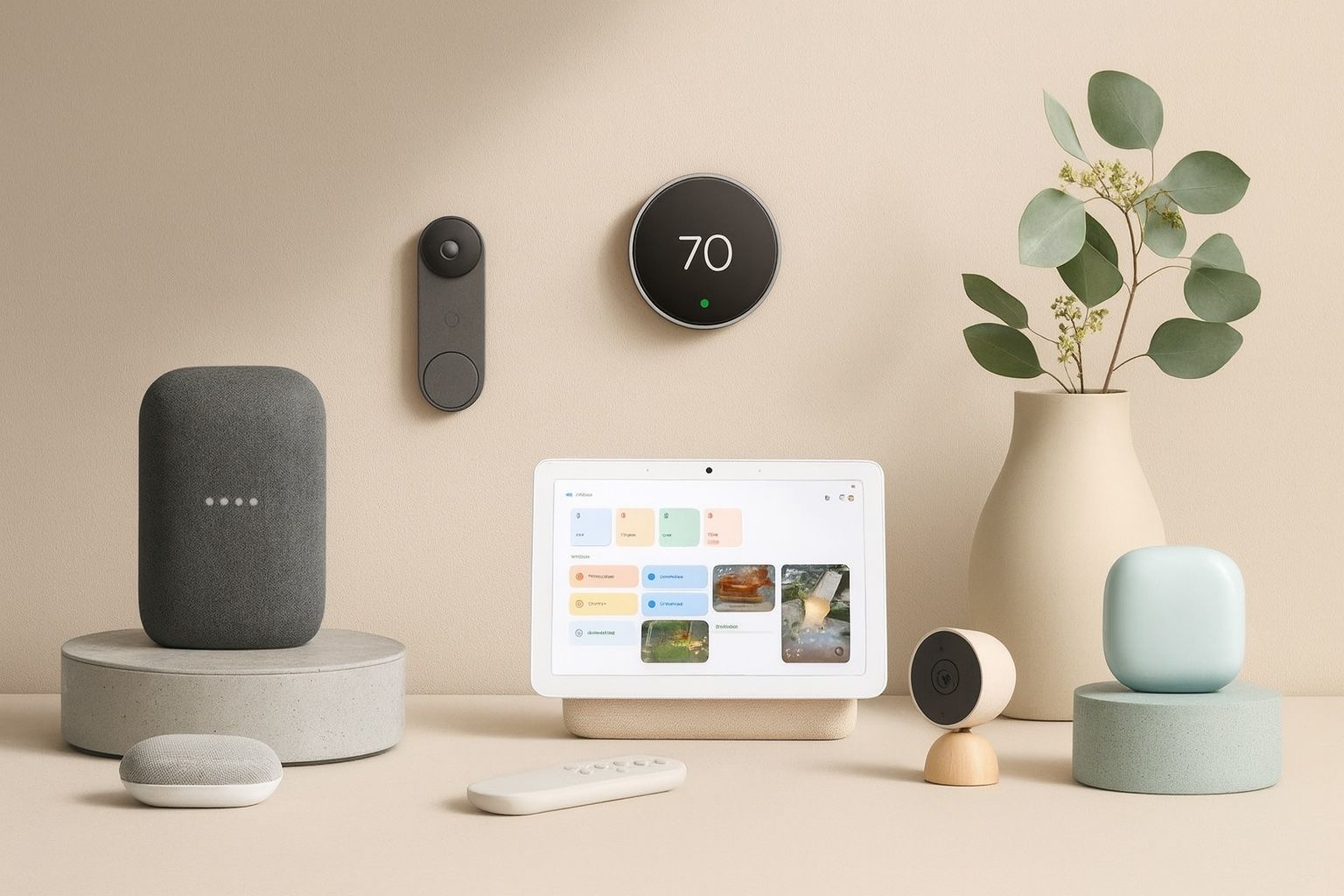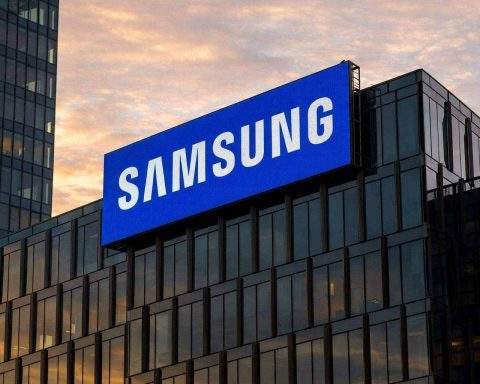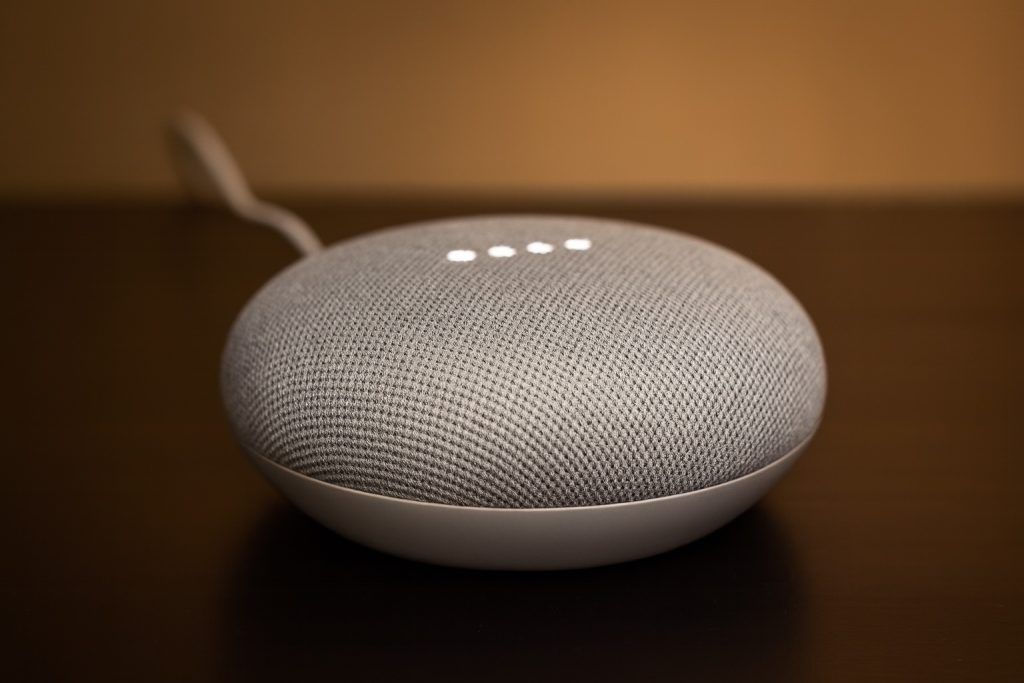Key Facts:
- Major Nest Refresh: Google is preparing its biggest Nest hardware refresh since 2021, with four new smart home devices – a 3rd-gen Nest Cam Indoor, a 2nd-gen Nest Cam Outdoor, a 3rd-gen Nest Doorbell (wired), and a new Gemini-powered smart speaker androidcentral.com androidcentral.com. All are expected to launch soon (teased at the Pixel event) and come with significant upgrades.
- 2K HDR Video & Zoom: The new Nest Cams and Doorbell will bump resolution from 1080p to 2K HDR, a major upgrade in video quality androidcentral.com. They support 6× digital zoom with a “Zoom and Crop” feature to focus on specific areas (e.g. a baby’s crib or pet bed) androidcentral.com. The indoor cam comes in 3 colors (Snow, Berry, Hazel) and the outdoor cam in 2 (Snow, Hazel) androidcentral.com androidcentral.com.
- On-Device Smarts & Backup: Powered by Google’s new Gemini AI, the cameras offer smarter features. They can store up to 1 hour of video locally if Wi-Fi drops androidheadlines.com, and they provide 3 hours of event video previews (10-second clip highlights of each event) for quick review of recent activity androidheadlines.com. Existing Nest features like Activity Zones, Familiar Face Alerts, Garage Door Alerts remain, now augmented by new “intelligent alerts” that detect people, vehicles, or animals androidheadlines.com.
- “Daily Summaries” AI Recaps: A standout new feature is “Daily Summaries”, which uses Google’s Gemini AI to automatically generate a concise video recap of all the day’s noteworthy events captured by your Nest cameras androidcentral.com androidheadlines.com. In essence, your cameras will create a highlight reel of the day – so you can see in minutes what happened while you were home or away. This AI-driven summary is unique in mainstream security cams and aims to ensure you “won’t miss a thing” from your camera feed androidheadlines.com.
- New Gemini Smart Speaker: Google also teased a new “Google Home Speaker” (name TBC), a Gemini-powered smart speaker expected in late 2025 androidcentral.com. It’s described as a slightly bulkier Nest Mini, but with far more brains and audio brawn. It will feature 360‑degree balanced sound for improved audio quality androidcentral.com and a “Sound Sensing” capability to detect household noises like glass breaking or smoke alarms and alert you theverge.com. Notably, this next-gen speaker runs on Google’s Gemini AI, effectively replacing the old Google Assistant with a more powerful voice assistant. Users can still say “Hey Google,” but the assistant will leverage Gemini’s advanced reasoning and natural language skills theverge.com – enabling more conversational interactions and complex requests.
- Subscription Rebrand: To complement these upgrades, Google is reportedly rebranding the Nest Aware subscription. The familiar Nest Aware plans will become “Google Home Premium” with a second, higher tier called “Google Home Premium Advanced” androidcentral.com. While details are scarce, it suggests new AI features (like those Gemini-powered summaries or expanded video history) may be tied to subscription tiers. Google recently raised Nest Aware’s price to $10/month with no major changes, so the expectation is that Gemini’s most advanced capabilities could come under a paid plan theverge.com, similar to how Amazon bundles its Alexa AI upgrades into subscription offerings.
Google’s Big Nest Comeback – Finally Catching Up in Hardware
Google’s Nest lineup has gone four years without a major update, leaving some to wonder if Nest products were on the back burner androidcentral.com. The last significant releases came in 2021, and since then competitor cameras have surged ahead in specs – for example, Arlo’s flagship Ultra series has offered 4K video for years, and even budget-friendly Wyze just launched a 4K pan-tilt cam for $60 theverge.com. Google’s older Nest Cam maxed out at 1080p, lagging in pure video quality. Now, with this upcoming refresh, Google is addressing the hardware gap by jumping to crisp 2K HDR resolution across its new cameras androidcentral.com.
Besides sharper video, the new Nest Cam Indoor (3rd Gen) and Nest Cam Outdoor (2nd Gen, wired) are getting much-needed feature upgrades. Both will support up to 6× digital zoom with a clever Zoom & Crop ability, allowing the camera to stay focused on a designated zone (say, a specific door or your toddler’s play area) and provide a clear close-up when needed androidcentral.com. This can help capture details without needing an expensive optical zoom lens. The cameras will also have improved low-light performance thanks to HDR, which should make night footage clearer. Google is keeping popular Nest features like customizable Activity Zones and Familiar Face Alerts (where the camera recognizes known faces), and is adding new AI-based alerts to flag important activity – for example, if the camera specifically spots a person, animal, or vehicle, you’ll get an “intelligent alert” highlighting that androidheadlines.com.
Importantly, Google is baking in some resilience and convenience. If your internet goes down, these new cams can store about an hour of recorded video locally so you don’t lose footage during outages androidheadlines.com. And rather than combing through hours of clips, you can rely on the 3-hour event preview timeline: the Google Home app will show 10-second video snippets of each motion event in the last 3 hours androidheadlines.com. That makes it easy to catch up on recent events at a glance – a quality-of-life improvement for users who frequently check their camera feeds.
All devices in this lineup will be powered by Google’s “Gemini” AI, which is Google’s latest and most advanced artificial intelligence model. In practical terms, Gemini’s inclusion means these Nest cams should get smarter at understanding what they see and delivering helpful summaries or notifications. As one report put it, “all of them are expected to be powered by Gemini”, marking a unifying theme of AI enhancements across the new hardware androidcentral.com. Google appears to be leveraging its prowess in AI to differentiate its hardware: while rivals might have matched or exceeded Nest on pure specs before, Google’s aim is to leapfrog with intelligence. In a direct comparison between Arlo and Nest earlier this year, reviewers noted that Nest outshined Arlo in smart alerts and AI capabilities, even though Arlo offered higher resolution video safehome.org. Now, by upgrading to 2K HDR, Google is closing the spec gap while doubling down on AI, effectively playing to its strength in machine learning.
Nest Doorbell Upgraded – Sharper Eyes and AI-Driven Summaries
The Nest Doorbell (3rd Gen, wired) is also getting a significant upgrade. Leaks indicate it will capture video at 2K resolution with HDR (up from the current 1080p), bringing much crisper footage of your doorstep theverge.com. The design isn’t expected to change dramatically (early images suggest it looks similar to its predecessor) theverge.com, but under the hood it gains the same new features as the Nest cams. That means 6× zoom and crop, HDR imaging, the 3-hour event clip history, and local backup recording in case of Wi-Fi loss androidheadlines.com – all very welcome improvements for home security enthusiasts.
Where the new Nest Doorbell really stands out is the introduction of “Daily Summaries.” This feature, reportedly available across the new Nest Cam Indoor, Outdoor, and Doorbell, will use AI to compile a daily video recap of events androidheadlines.com. Imagine getting home and, instead of wading through dozens of motion alerts or scrolling through hours of footage, you can just watch a brief summary that highlights all the key moments caught on your cameras that day. Google is essentially leveraging its Gemini AI to act like a personal video editor, finding the important bits and stitching them together into a narrative of your day. According to reports, Daily Summaries will give you “a quick wrap of your day, with the help of Gemini” androidcentral.com – for example, it might show a montage of the deliveries, visitors, and notable movements that occurred, all in one go. This kind of AI-driven highlight reel is uncommon in mainstream security camera systems today. It’s reminiscent of features in niche products (some baby monitors or pet cams offer daily highlight videos invidyo.com), but seeing it in Google’s ecosystem could take it mainstream.
From a privacy and usefulness standpoint, Daily Summaries could be a game-changer if done right. It addresses alert fatigue – many camera owners get so many motion notifications that they end up ignoring them or missing the important ones. Having the AI filter and summarize the feed could make home monitoring much more user-friendly. Of course, some users might be wary of an AI deciding what’s “important” – but given Google’s expertise in computer vision, the system will likely prioritize things like people and significant movements over trivial events (like a tree branch swaying). It’s also likely that this feature will be tied into Google’s subscription service (the renamed Google Home Premium), as cloud processing and storage for these summaries will incur costs. We’ll have to wait for official word on whether Daily Summaries are included for free or only for subscribers, but it’s exactly the kind of value-add that subscription plans are made for.
In terms of aesthetics and options, the leaked info says the new doorbell will come in three colors: Snow (white), Hazel (gray), and a beige tone reportedly called Linen androidheadlines.com. So, Google is expanding its color palette to better match different home decor (previous Nest doorbells were usually white or black). While colors don’t change functionality, it’s a nod to consumer preference for devices that blend into the home. The physical design aside, it’s the internal upgrades and AI features that set this doorbell apart from both its predecessors and its competitors.
Speaking of competitors – in the video doorbell arena, Google’s chief rival is Amazon’s Ring. Ring’s latest doorbells (like the Ring Video Doorbell Pro 2 or Battery Doorbell Plus) still record at around 1080p to 1536p resolution and rely on motion alerts and snapshots, without any AI-generated daily summary feature. Amazon has introduced package detection and some smart alerts for Ring (and Alexa can announce when a person or package is at the door), but automated video storytelling is something new Google is bringing. Other brands like Arlo and Eufy have 2K doorbells and even offer some local AI (for instance, Eufy’s doorbell can recognize faces and distinguish humans vs. animals on-device), yet a unified daily recap isn’t common. Google’s approach could set a new bar if it proves accurate and useful. As one tech outlet succinctly put it, the new Nest lineup’s “Daily Summaries” are expected to “give you a recap of all your recorded events, like a quick wrap of your day” powered by AI androidcentral.com. This could become a flagship selling point for the Nest ecosystem, especially for users who don’t have time to monitor their feeds constantly.
The Gemini Smart Speaker – Google’s Answer to Alexa’s Next Chapter
Google isn’t stopping at cameras and doorbells. Perhaps the most intriguing device in this leak is the mystery smart speaker, internally referred to as the Google Home Speaker, which was given a sneak peek at the Pixel launch event androidcentral.com androidcentral.com. This device is Google’s first new smart speaker since 2021, and it represents a bold jump into the era of AI-driven voice assistants. In fact, it’s built around “Gemini for Home,” the codename for Google’s next-gen smart home assistant that leverages their advanced Gemini AI model. Jennifer Pattison Tuohy, a smart home expert at The Verge, calls Gemini for Home an “all-new, more powerful assistant” for Nest devices theverge.com – one that will “feel fundamentally new” compared to the old Google Assistant theverge.com.
What does that mean for users? In practical terms, the Gemini-powered Google Home Speaker should be capable of much more natural, conversational interactions. Google says this new assistant will use “advanced reasoning, inference and search capabilities” of its AI models to handle complex requests and context theverge.com. For example, you might say, “Hey Google, turn off all the lights except the kitchen and set the thermostat to 72,” and it can understand the combined command in one go. Or ask, “Play that song from this summer’s blockbuster about race cars,” and Gemini’s reasoning could figure out you mean the Fast & Furious movie soundtrack theverge.com. These are the kinds of tasks that used to trip up voice assistants unless phrased very explicitly. With Gemini, Google aims to make the assistant smarter at interpreting what you intend, not just what you literally say. It even plans to allow back-and-forth conversation without repeating “Hey Google” for each follow-up (a feature called Gemini Live) theverge.com, so you can have a more fluid dialogue when, say, planning a recipe or your schedule.
The new speaker itself is rumored to have 360° audio with balanced sound, despite being relatively small androidcentral.com. In other words, Google is promising better sound quality than the tiny Nest Mini, likely closer to a Nest Audio in richness, but in a compact form factor. If true, it could serve both as a music speaker and a voice assistant hub. Additionally, the speaker will support pairing with a Google TV streamer for enhanced TV audio androidcentral.com – possibly allowing two units to work as a stereo pair or to act as a soundbar-like output for your TV. This hints at Google wanting to integrate its smart speakers with home entertainment setups (an area where Amazon’s Echo can already pair with Fire TV, for example).
One of the most interesting new abilities is “Sound Sensing.” The Gemini speaker will use its microphones not just for voice commands, but also to monitor ambient sounds for danger signals theverge.com. It can listen for the sound of glass breaking (indicative of a possible break-in) or a smoke/CO alarm going off, and then alert you or take action. This effectively doubles the speaker as a basic security monitor, similar to what Amazon introduced with Alexa Guard on Echo devices. Having this built-in, especially if it’s free to use, adds a layer of home safety without needing dedicated sensors. It’s another example of AI enabling more proactive features: the device can “understand” a sound and decide if it’s something the user should know about.
From a competitive standpoint, this new Google Home Speaker is clearly aimed at countering Amazon’s recent advances with Alexa. Earlier in 2025, Amazon announced Alexa Plus (Alexa+), a generative AI upgrade to its voice assistant, which has been rolling out as an early-access feature to Echo devices theverge.com. Alexa Plus likewise makes Alexa more conversational and capable – for instance, letting you chain commands, ask follow-up questions, or have Alexa perform multi-step tasks like booking a restaurant via voice. By mid-2025, Amazon already had over a million users testing Alexa’s new AI smarts theverge.com, and it plans a broad rollout. Google’s answer is Gemini for Home, and the race is officially on. As The Verge noted, Amazon’s generative-AI powered Alexa is already in millions of households, so Google bringing a smarter assistant to the home now is a timely catch-up theverge.com theverge.com. With both tech giants pushing AI-driven assistants (and both likely tying the best features to subscriptions or premium plans), the smart speaker space is heating up again.
And where is Apple in all this? Apple’s HomePod and Siri have so far remained relatively unchanged – Siri hasn’t gotten a public generative AI upgrade akin to Alexa+ or Gemini. Industry watchers have quipped that we’re “still waiting for the third competitor, Apple, to get on the track” of the smart home AI race theverge.com. Apple tends to focus on privacy and on-device processing, so any Siri advancements may come more slowly or differently. For now, the momentum is with Amazon and Google. Google’s strategy seems to be leveraging its arguably superior AI research (Gemini is the same family of AI models that power Google’s Bard chatbot and other services) to make Google Home the most “reliable and capable smart home voice assistant” available theverge.com. If the new hardware (Nest speakers/displays) and software (Gemini assistant) deliver as promised, Google could close the gap with Alexa and even surpass it in certain aspects, given Google’s expertise in search and contextual understanding.
Other Upcoming Models and Competitors to Watch
Beyond Google’s own ecosystem, it’s worth looking at what competitors are doing and how these Nest upgrades fit into the broader smart home landscape. Amazon, as mentioned, has been aggressively innovating with Alexa’s AI. Alongside Alexa+, Amazon has been updating its Echo device lineup. In late 2024, Amazon introduced new Echo models (like updated Echo Show displays and Echo speakers) with improved processors to handle AI features. We can expect Amazon to continue that trend, possibly with an Alexa-centric hardware event in fall 2025 to showcase devices optimized for Alexa’s new capabilities. Amazon’s strategy often involves tight integration – for example, using an Echo Show’s camera and screen to let Alexa+ show you summarized info or take actions (Amazon demonstrated Alexa summarizing security camera feeds and helping with tasks like finding a handyman via voice). Google, by comparison, has been slower to integrate AI into hardware, but Gemini for Home is a decisive step in that direction. It’s telling that Google hadn’t refreshed the Nest Hub or Nest Audio in several years theverge.com; the fact that new hardware is coming alongside Gemini’s launch suggests Google knows it needs fresh devices to truly compete.
In the security camera market, Arlo, Eufy, Ring, Wyze, and others are all vying for consumers, each with different strengths. Arlo has positioned itself with high-end specs (the Arlo Ultra 2 offers 4K video and HDR, for example) and a wider variety of camera models, from floodlight cams to wire-free 2K cams. Wyze has shaken up the budget segment by offering surprisingly advanced cameras at rock-bottom prices – as noted, Wyze’s new Cam Pan v4 provides 4K Ultra HD, pan/tilt, color night vision, and AI tracking of people/pets for under $60 theverge.com. That undercuts Nest by a huge margin on price, though Wyze’s cloud AI features require a subscription too (Cam Plus). Eufy (by Anker) has gone the route of local AI processing, touting privacy – their EufyCam 3, for instance, records in 4K and uses an on-home-base “BionicMind” AI for face recognition, all without cloud fees. Google’s Nest cameras historically offered some local processing (e.g., on-device person detection in newer models), but heavily leaned on cloud AI for things like familiar face recognition (a paid Nest Aware feature). With Gemini, Google’s AI will likely still run in the cloud (given the complexity of an LLM), but the hope is it will unlock more powerful capabilities that others can’t easily match.
One area Google is uniquely leveraging is cross-device synergy with AI. For example, your Nest Cam’s Daily Summary might not just be a video clip – conceivably, the Gemini assistant on your speaker or phone could narrate it or answer questions about it. (Picture asking, “Hey Google, what did I miss at home today?” and getting a spoken summary in addition to the video highlights.) We don’t have confirmation of that specific interaction yet, but it fits Google’s overarching plan to weave generative AI into all its products. Amazon’s Alexa can give you a rundown of your day’s notifications or security alerts, but Google might integrate the actual visual summary with its voice assistant in a seamless way.
It’s also notable that Google is rebranding Nest Aware to Google Home Premium, and possibly introducing an “Advanced” tier androidcentral.com. This suggests a broader strategy to unify its smart home offerings under the Google Home brand (Nest as a brand has slowly been merging back into Google’s umbrella). The Advanced tier could be where features like longer video retention, 24/7 recording, and the most advanced AI alerts/summaries reside. Amazon is doing something analogous by folding Alexa’s AI features into its existing services (Alexa Plus features are included for Amazon Prime members, for instance) theverge.com. We may see smart home ecosystems increasingly divided into free vs paid experience: basic functionality at no charge, but the “wow” AI features costing extra. Google will have to balance this carefully – if Daily Summaries or key AI abilities sit behind a paywall, will it drive more subscriptions or frustrate users who expect those features out-of-the-box?
Conclusion: A New Era of Smart Homes Driven by AI
Google’s forthcoming Gemini-powered Nest devices represent a significant pivot toward AI-centric smart home hardware. By upgrading the cameras and doorbell to modern specs like 2K HDR and infusing them with Google’s latest AI, the company is addressing past shortcomings and betting on intelligence over just imagery. The new Nest Cam and Doorbell will finally deliver the clarity and features users have been asking for, while Gemini’s on-board smarts aim to elevate them above commoditized cameras with features like automatically curated daily recap videos of your home’s events. The new smart speaker, meanwhile, is poised to show off Google’s AI might in a very tangible way – if it can provide a more helpful, conversational, and proactive assistant experience than Alexa, it could re-establish Google as a leader in the smart speaker race. Experts are calling Gemini for Home Google’s “biggest smart home play in years,” underlining how pivotal this launch is theverge.com.
Of course, success is not guaranteed. Google will need to execute well on both software and hardware. The devices must be reliable (early bugs in AI features could sour users quickly), and the company will have to convince consumers that these upgrades are worth the investment – especially if it involves subscribing to yet another service for full functionality. Additionally, Amazon isn’t standing still; by the time Google’s devices hit the market in full, Alexa’s generative AI could be ubiquitous in Echo households, and Amazon’s own hardware updates (perhaps new Echos or Ring cameras with AI features) may launch. And let’s not forget the privacy aspect: with more AI analysis of personal data (video, audio) in the cloud, Google will face scrutiny on how it handles that data securely.
Still, for consumers and smart home enthusiasts, the end of 2025 looks exciting. We’re about to see cameras that don’t just record what happens, but also understand and summarize it for you. We’ll have voice assistants that can actually hold a conversation and perform complex tasks as true virtual helpers. And we’ll likely see a resurgence of competition and innovation in a sector that had grown a bit stagnant the past couple of years. Google’s new Nest lineup, infused with Gemini AI, is a bold bid to leap ahead. If it delivers on its promises, your next security camera or smart speaker might not only be smarter than before – it could make your entire home feel more intelligent and intuitive. In the words of Google’s own product chief, using Gemini in the home will “feel fundamentally new” theverge.com – and that’s an enticing prospect as we stand on the cusp of this AI-powered smart home era.
Sources: Google’s leaked Nest product details androidcentral.com androidcentral.com; Android Headlines leak report androidheadlines.com androidheadlines.com; The Verge coverage of Gemini for Home and device leaks theverge.com theverge.com; Android Central report on upcoming Nest features androidcentral.com androidcentral.com; The Verge on Wyze’s 4K camera and industry context theverge.com; SafeHome security camera comparisons safehome.org; The Verge analysis of the Alexa vs Google Assistant AI race theverge.com.









